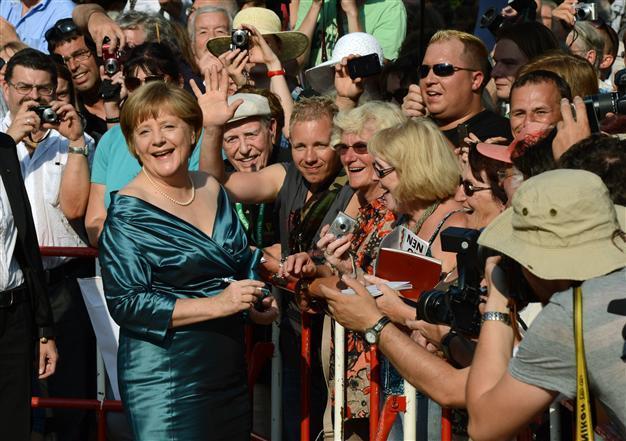Bayreuth Festival opens after Nazi tattoo scandal
BAYREUTH, Germany - Agence France-Presse

German Chancellor Angela Merkel signs autographs as she arrives for the opening of the Bayreuth Wagner Opera Festival. AFP Photo
Germany's
Bayreuth Festival held its opening gala Wednesday, with Chancellor Angela Merkel among the guests, days after weathering a scandal over an opera singer's
Nazi tattoo.
The festival's 101st edition was launched with the premiere of a hotly-awaited new production of composer Richard Wagner's "The Flying Dutchman" by young upcoming German director Jan Philipp Gloger.
The Russian bass-baritone originally cast in the title role, Yevgeny Nikitin, announced last weekend that he was pulling out following a row over a tattoo of a Nazi symbol he sports on his chest.
The scandal proved a major headache for the festival's organisers, who had just four days to find a new lead singer.
Korean bass-baritone Samuel Youn, 40, who has regularly appeared in more minor roles in Bayreuth since 2004 and is already cast to sing the king's herald in a revival of "Lohengrin", agreed to take the part.
Nikitin's withdrawal was "fully in line with our policy of completely rejecting Nazi ideology in any shape or form", said festival co-chiefs Katharina Wagner, 34, and her half-sister Eva Wagner-Pasquier, 67.
With the new singer in the title role, the curtain went up for a glitzy night with Germany's political and social elite on the guest list.
Merkel has long been a regular at the annual month-long music festival dedicated to the works of Wagner, even before she became chancellor.
Crowds lined the road to cheer her and other guests as they drove up to the fabled "Green Hill" on the town's outskirts on top of which stands the legendary Festspielhaus theatre built to Wagner's own designs.
Among the guests were Economy Minister Philipp Roesler, Foreign Minister Guido Westerwelle, EU health and consumer commissioner John Dalli, and the state premiers of Baden-Wuerttemberg and Bavaria.
The Bayreuth Festival, the world's oldest summer music festival and founded by Wagner himself, is beloved by opera buffs but has also been haunted by its association with the rise of Nazism in Germany.
Wagner, a notorious anti-Semite, was Adolf Hitler's favourite composer, and Hitler became a regular guest at the festival, using it as part of the Nazis massive wartime propaganda apparatus.
While the new leadership has pledged to open up the festival archives to independent historians to fully explore the festival's Nazi past, the topic remains an extremely sensitive issue.
Organised separately from the festival, a new exhibition entitled "Silenced Voices" is being staged in the park in front of the Festspielhaus.
It examines anti-Semitism at the Bayreuth Festival from its very beginnings in 1876 to the end of World War II and tells the stories of some of the leading singers, instrumentalists and conductors who were locked out of the festival on account of their Jewishness.
Also on the programme is a revival of last year's new production of "Tannhaeuser" by Sebastian Baumgarten, which was vilified by critics and audiences for setting Wagner's tale of a minstrel-knight in a biogas plant. There will also be revivals of a 2010 production of "Lohengrin", a production of "Parsifal" dating back to 2008; and a "Tristan and Isolde" from 2005.
For many Wagner fans, this year's festival will merely act as a prelude to celebrations marking the 200th anniversary of Wagner's birth next year.
Controversial German theatre director Frank Castorf has been chosen to stage Bayreuth's new production of Wagner's magnum opus, the sprawling four-opera "Ring" cycle, in the bicentenary year and Russian conductor Kirill Petrenko will be in pit.
Penny-pinching Merkel recycles dress for Bayreuth premiere
BAYREUTH, Germany - Agence France-Presse
Chancellor Angela Merkel, who has become a hate figure across much of Europe for her strict austerity drive, put her money where her mouth is and wore an old dress for the Bayreuth Festival.
Merkel, who topped the guest list for the glittering opening gala of the legendary music festival late Wednesday, wore the same metallic blue dress that she appeared in four years ago.
And the national press was quick to pick up and heap praise on Merkel's thriftiness.
"The cost-cutting chancellor recycles her dress," ran the headline in the mass-circulation daily Bild.
The regional Berliner Zeitung pointed out that Merkel last wore the dress in the crisis year of 2008 and the Frankfurter Rundschau said: "It's a time of belt-tightening for everyone." The weekly magazine Der Spiegel, in its online edition, said that by choosing to wear an old dress, Merkel was practicing what she preached in these times of crisis: "frugality and down-to-earthness."
Nevertheless, the chancellor was carrying a black handbag, rather than the blue purse she had sported four years ago and also wore different shoes, the magazine noted.
Merkel has long been a regular at the annual month-long music festival dedicated to the works of Richard Wagner, even before she became chancellor.
Polls show she remains one of Germany's most popular politicians -- partly because of her austerity-led approach to the eurozone crisis -- and she was swamped with requests to sign autographs as she arrived at the event.
This year's opening night was the premiere of a new production of "The Flying Dutchman" that was hit by scandal when the Russian opera star cast in the title role pulled out just four days before the curtain was due to go up. In the end, South Korean bass-baritone Samuel Youn stepped in to salvage the night and received tumultuous applause.
By contrast, the artistic team, under director Jan Philipp Gloger, was loudly booed.
After the performance, Merkel praised the musical performances, but said nothing about the staging.
